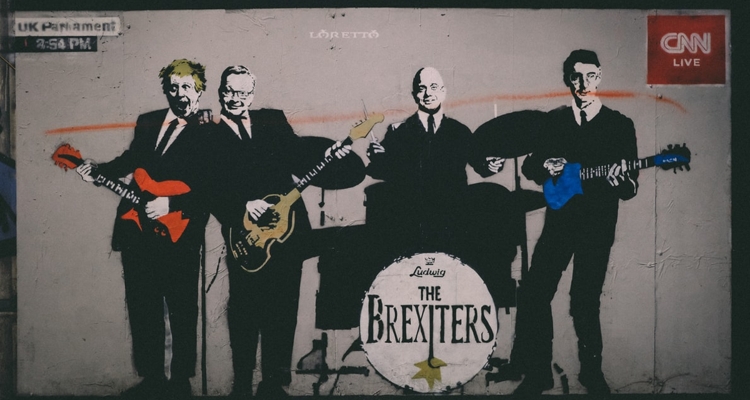Earlier this week, the Independent Society of Musicians (ISM) revealed just how detrimental Brexit has been to the income and careers of touring musicians in the UK. While everyone who was in their right mind, when they strolled down to the polling station, knew that our ability to move and work freely throughout Europe would be infringed by voting to leave, the results of the recent survey illustrate how many livelihoods have been dilapidated by the dream of nationalism.
The cultural impact of Brexit may be a drop in the ocean when you consider the exacerbation in the cost-of-living crisis and the obscene levels of inflation that reached a 45-year high and plunged previously comfortable families into poverty. But the recently published figures are enough to make you feel claustrophobic about the prospect of being trapped on a late-stage capitalism island intent on ostracising itself into global redundancy.
The ISM survey revealed:
- Since Brexit, one in four industry workers haven’t picked up any work in Europe.
- Almost 50% of UK industry workers noted a significant downturn in income opportunities in Europe.
- 39% of industry workers have had to turn down work in Europe due to restrictions imposed by Brexit.
While many voters who voted leave like to justify their blindsided democratic decision by blaming the Brexit fallout on other factors, such as the Covid pandemic and Russia’s invasion of Ukraine, the ISM was careful to ensure the data they extrapolated from the survey was accurate. They asked all 400 participants to focus on their experiences between the 1st of January 2021 and April 2023 to ensure that Covid restrictions weren’t the main source of income and employment stagnation.
Unsurprisingly, one of the 400 participants in the ISM survey stated that their working band has folded due to gigs in Europe drying up as they couldn’t make any kind of living solely bumbling around the tiny market in the UK. While there is a romantic notion that artists should suffer for their art, the line has to be drawn somewhere, and that is where we have to take a stand. You can’t blame European companies, bookers, and promoters for not wanting to deal with the red tape of booking UK musicians and industry workers. There are so many grey areas in the legislation, especially revolving around import and export taxation that it isn’t worth the risk or the headache to outsource UK talent.
Is There Light at the End of the Brexit Tunnel?
Even though it is unlikely that the current Government will listen to the pleas for intervention and consider ways they could bring viability back to the prospect of making a living as a professional musician, the demise of our music sector isn’t something that should be taken lying down. Apathy is a cancer. If all we do is lament about the current state of affairs, this generation of artists and industry professionals will suffer just as much as the next, and the next one after that.
Unless artists band together and prove how detrimental the loss of income to the UK’s culture sector is and build on the work of the ISM’s study, it is unlikely that the future of our apparently ‘world-class’ music sector will be high on the agenda for policymakers. Thanks to the good work and the insistence that something has to give, there have been some promising moves, but just like any movement, it needs real momentum to get anywhere. If you’re intent on keeping your ennui on the situation insular, consider yourself as part of the problem.
In April 2023, The Guardian revealed that a highly influential Lords Committee is pushing to remove Brexit barriers for musicians and young people. After six months of research, 72 areas where small changes could result in massive differences for industry workers on both sides of the channel were identified. So, even if re-joining the EU is out of the current realm of possibility, that isn’t to say that we should give up the ghost on cutting some of the red tape. Potential areas to focus on include the expense, accessibility and viability of work permits and visas and the cost and confusion around carnets (customs permits).
The fact that the Trade and Cooperation Agreement that was signed in December 2020 by the UK and the EU did not include any specific provisions on short-term travel for musicians and industry workers should also be taken as a positive.
In 2021, the House of Commons Culture Committee recognised that barriers have blighted the cultural ecosystem and made it needlessly difficult to move equipment and merch. The ISM has made several recommendations to the government to remove some of those barriers, including negotiating a waiver agreement on the 90 / 180-day working rule.
–
You can read the full ISM report and discover all the ways they are helping artists navigate Brexit barriers here.
For more independent artist advice, keep your eyes peeled for more independent artist advice articles.
Article by Amelia Vandergast




2 Comments
How ‘The Brit Fest’ Became a Tragic Sign of the Post-Brexit Live Music Industry -
7 February 2024 at 4:11 pm[…] To learn more about how Brexit has impacted the music industry, read our statistical overview of the crushing blow of Brexit on the music industry. […]
Election Promises: How Will They Impact the Music Industry? -
20 June 2024 at 3:00 pm[…] the EU, making it easier for musicians to tour Europe, a critical move for artists affected by post-Brexit travel […]